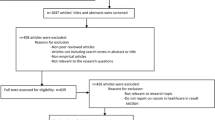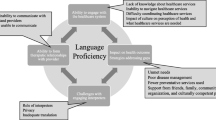ABSTRACT
BACKGROUND
Patient-centered care—including the domains of access and communication—is an important determinant of positive clinical outcomes.
OBJECTIVE
To explore associations between race and HIV-infected patients’ experiences of access and communication.
DESIGN
This was a cross-sectional survey.
PARTICIPANTS
Nine hundred and fifteen HIV-infected adults receiving care at 14 U.S. HIV clinics.
MEASUREMENTS
Dependent variables included patients’ reports of travel time to their HIV care site and waiting time to see their HIV provider (access) and ratings of their HIV providers on always listening, explaining, showing respect, and spending enough time with them (communication). We used multivariate logistic regression to estimate associations between patient race and dependent variables, and random effects models to estimate site-level contributions.
RESULTS
Patients traveled a median 30 minutes (range 1–180) and waited a median 20 minutes (range 0–210) to see their provider. On average, blacks and Hispanics reported longer travel and wait times compared with whites. Adjusting for HIV care site attenuated this association. HIV care sites that provide services to a greater proportion of blacks and Hispanics may be more difficult to access for all patients. The majority of patients rated provider communication favorably. Compared to whites, blacks reported more positive experiences with provider communication.
CONCLUSIONS
We observed racial disparities in patients’ experience of access to care but not in patient–provider communication. Disparities were explained by poor access at minority-serving clinics. Efforts to make care more patient-centered for minority HIV-infected patients should focus more on improving access to HIV care in minority communities than on improving cross-cultural patient–provider interactions.

Similar content being viewed by others
References
Shapiro MF, et al. Variations in the care of HIV-infected adults in the United States: results from the HIV Cost and Services Utilization Study. J Am Med Assoc. 1999;281(24):2305–15.
Andersen RM. Revisiting the behavioral model and access to medical care: does it matter? J Health Soc Behav. 1995;36(1):1–10.
Gebo KA, et al. Racial and gender disparities in receipt of highly active antiretroviral therapy persist in a multistate sample of HIV patients in 2001. J Acquir Immune Defic Syndr. 2005;38(1):96–103.
McNaghten AD, et al. Differences in prescription of antiretroviral therapy in a large cohort of HIV-infected patients. J Acquir Immune Defic Syndr. 2003;32(5):499–505.
Moore RD, et al. Racial differences in the use of drug-therapy for HIV disease in an urban community. N Eng J Med. 1994;330(11):763–8.
Asch SM, et al. Underuse of primary Mycobacterium avium complex and Pneumocystis carinii prophylaxis in the United States. J Acquir Immune Defic Syndr. 2001;28(4):340–4.
Schneider EC, Zaslavsky AM, Epstein AM. Racial disparities in the quality of care for enrollees in Medicare managed care. J Am Med Assoc. 2002;287(10):1288–94.
Smedley BD, Stith AY, Nelson AR. Unequal Treatment: Confronting Racial and Ethnic Disparities in Health Care. Washington, D.C.: National Academy Press; 2002.
Bach PB, et al. Primary care physicians who treat blacks and whites. N Eng J Med. 2004;351(6):575–84.
Baicker K, et al. Who you are and where you live: how race and geography affect the treatment of medicare beneficiaries. Health Affairs, 2004. Suppl Web Exclusives: p. VAR33–44.
Doescher MP, et al. Racial/ethnic inequities in continuity and site of care: location, location, location. Health Serv Res. 2001;36(6 Pt 2):78–89.
Probst JC, et al. Effects of residence and race on burden of travel for care: cross sectional analysis of the 2001 US National Household Travel Survey. BMC Health Serv Res. 2007;7(40).
Johnson RL, et al. Racial and ethnic differences in patient perceptions of bias and cultural competence in health care. J Gen Intern Med. 2004;19(2):101–10.
Cooper-Patrick L, et al. Race, gender, and partnership in the patient-physician relationship. J Am Med Assoc. 1999;282(6):583–9.
Johnson RL, et al. Patient race/ethnicity and quality of patient-physician communication during medical visits. Am J Public Health. 2004;94(12):2084–90.
Institute of Medicine, Crossing the quality chasm: a new health system for the 21st century, ed. C.o.Q.o.H.C.i. America. Washington, D.C.: National Academy Press; 2001:xx, 337.
Balint J. The possibilities of patient-centered medicine. J R Coll Gen Pract. 1969;17:269–76.
Lipkin M. Suggestion and healing. Perspect Biol Med. 1984;28(1):121–6.
Beach MC, Saha S, Cooper LA. The role and relationship of cultural competence and patient-centeredness in health care quality. Commonwealth Fund Report 2006. Available at http://www.commonwealthfund.org/publications/publications_show.htm?doc_id=413721#areaCitation. 2006 [cited 2008 July 16].
Berry LL, Seiders K, Wilder SS. Innovations in access to care: a patient-centered approach. Ann Intern Med. 2003;139(7):568–74.
Beach MC, Duggan PS, Moore RD. Is patients’ preferred involvement in health decisions related to outcomes for patients with HIV? J Gen Intern Med. 2007;22(8):1119–24.
Beach MC, Keruly J, Moore RD. Is the quality of the patient-provider relationship associated with better adherence and health outcomes for patients with HIV? J Gen Intern Med. 2006;21(6):661–5.
Fleishman JA, et al. Hospital and outpatient health services utilization among HIV-infected adults in care 2000–2002. Med Care. 2005;43(9 Suppl.):III-40-III-52.
Gebo KA, et al. Hospital and outpatient health services utilization among HIV-infected patients in care 2000–2001. J Am Med Assoc. 2004.
Chander G, et al. Alcohol use among HIV infected persons in care: Results of a multi-site survey. HIV Med. 2008;(In Press).
Josephs JS, et al. Use of complementary and alternative medicine among a multistate, multisite cohort of people living with HIV/AIDS. HIV Med. 2007;8(5):300–5.
Lawrence PB, et al. The impact of illicit drug use and substance abuse treatment on adherence to highly active antiretroviral therapy (HAART). AIDS Care. 2007;19(9):1134–40.
Hargraves J, Hays R, Cleary P. Psychometric Properties of the Consumer Assessment of Health Plans Study (CAHPS(R)) 2.0 Adult core survey. Health Serv Res. 2003;38(6 Pt 1):1509–27.
Localio AR, et al. Adjustments for center in multicenter studies: an overview. Ann Intern Med. 2001;135(2):112–23.
StataCorp, Stata Statistical Software: Release 9.0. 2005, StataCorp: College Station, TX.
Hasnain-Wynia R, Baker DW. Obtaining data on patient race, ethnicity, and primary language in health care organizations: Current challenges and proposed solutions. Health Serv Res. 2006;41(4):1501–18.
Baicker K, Chandra A, Skinner JS. Geographic variation in health care and the problem of measuring racial disparities. Perspect Biol Med. 2005;48(1):S42–S53.
Blustein J. Who is accountable for racial equity in health care? JAMA. 2008;299(7):814–6.
Saha S, Arbelaez JJ, Cooper LA. Patient-physician relationships and racial disparities in the quality of health care. Am J Public Health. 2003;93(10):1713–9.
Lurie N, et al. Variation in racial and ethnic differences in consumer assessments of health care. Am J Managed Care. 2003;9(7):502–9.
Cooper LA, et al. Patient-centered communication, ratings of care, and concordance of patient and physician race. Ann Intern Med. 2003;139(11):907–15.
Saha S, et al. Patient-physician racial concordance and the perceived quality and use of health care. Arch Intern Med. 1999;159(9):997–1004.
Bozzette SA, et al. The care of HIV-infected adults in the United States: HIV Cost and Services Utilization Study Consortium. N Engl J Med. 1997;339(26):1897–904.
Acknowledgments
Preliminary results were presented as an oral abstract at the 30th Annual Society of General Internal Medicine meeting (April 2007, Toronto, Canada). This work was supported by the Agency for Healthcare Research and Quality (290–01–0012). Dr. Korthuis is supported by the National Institute on Drug Abuse (K23-DA019809). Dr. Saha is supported by an Advanced Research Career Development Award from the Department of Veterans Affairs Health Services Research & Development Service, and a Generalist Physician Faculty Scholar Award from the Robert Wood Johnson Foundation. Dr. Gebo received support from the Johns Hopkins Richard S. Ross Clinician Scientist Award. Dr. Beach is supported by the Agency for Healthcare Research and Quality (1-K08-HS13903). The views expressed in this paper are those of the authors. No official endorsement by DHHS, the National Institutes of Health, the Agency for Healthcare Research and Quality, the Robert Wood Johnson Foundation, or the Department of Veterans Affairs is intended or should be inferred.
Conflict of Interest
None disclosed.
Author information
Authors and Affiliations
Consortia
Corresponding author
Rights and permissions
About this article
Cite this article
Korthuis, P.T., Saha, S., Fleishman, J.A. et al. Impact of Patient Race on Patient Experiences of Access and Communication in HIV Care. J GEN INTERN MED 23, 2046–2052 (2008). https://doi.org/10.1007/s11606-008-0788-5
Received:
Revised:
Accepted:
Published:
Issue Date:
DOI: https://doi.org/10.1007/s11606-008-0788-5




